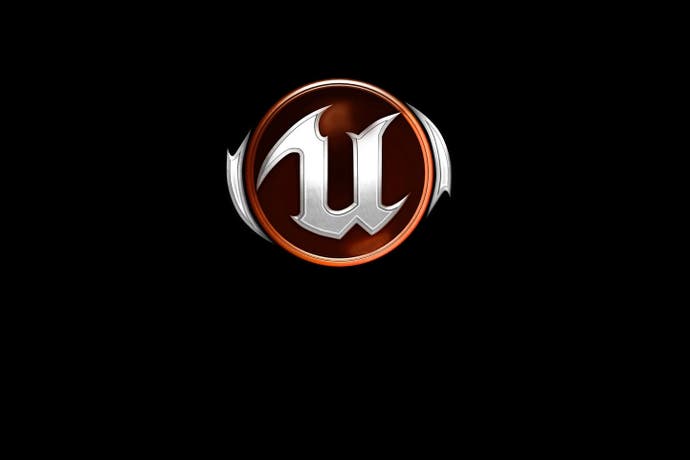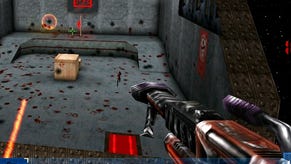Unreal Tournament retrospective
Flak canon.
I've killed my little brother Matt hundreds of times. I've killed him on a gunboat. I've killed him on a train. I've killed him on a spaceship, but not, sadly, on a plane. It's been reciprocated in kind, too. He's sniped my head off on an asteroid, dropped a nuke into my castle, and splattered my giblets across a cathedral floor. Ah, memories.
Nothing is more conducive to a healthy sibling relationship than the ability to kill each other once in a while, and as a kid I was incredibly fortunate that such an opportunity was available so often. I have a memory from a weekend in the early nineties of my dad and my uncle setting up a LAN in the living room to play Doom multiplayer together, which they let us play with for a couple of hours afterwards. It was the first time I killed my brother, and it wouldn't be the last.
We went on to play an eclectic mixture of whatever I could get to work over LAN. Half Life: Opposing Force Deathmatch was a popular choice as it had plenty of small maps suitable for three players. Others included Operation Flashpoint, for which I'd create custom scenarios for us to play through using the Mission Editor, a Half-Life mod called Firearms that was almost certainly terrible, and the Age of Empires clone Star Wars: Galactic Battlegrounds. But there was one game which always stood triumphantly atop the podium, and it was of course the game built for the job from the ground up.
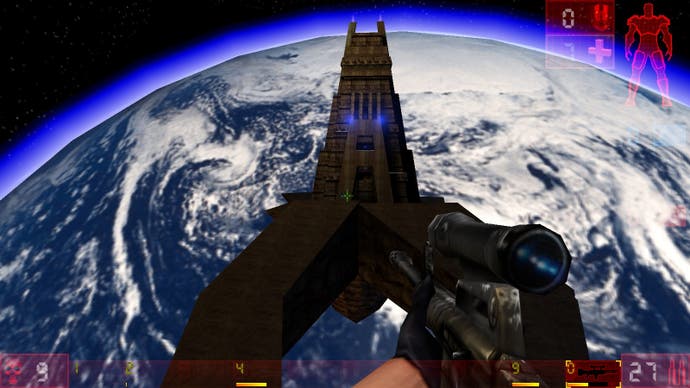
Whereas most games at that time only dabbled with multiplayer, Unreal Tournament embraced it wholeheartedly. It has a range, an immediacy and a deliberately ostentatious style that no multiplayer FPS, not even its own sequels, have matched since. Yet our initial attraction to UT stemmed from a far more straightforward reason: it had absolutely brilliant bots.
These days bots are out of vogue. Their reputation has been damaged by some hideous recent examples such as the embarrassing companion AI of the Left 4 Dead games, and the ubiquity and reliability of modern internet connections makes them largely unnecessary. Back then the situation was reversed. The internet was far less dependable, especially when you had three PCs scrabbling at the same 56k modem, while AI development was a much greater focus in game design than it is now.
Unreal Tournament's bots are a prime example of this, with some of the best AI scripts ever committed to code. Their navigation capabilities are superb, not simply in their innate knowledge of maps and their key locations, but their ability to leap acrobatically around the map without missing a stride, and use the level's terrain to their advantage. I don't think I've ever seen one get stuck on level geometry. Moreover, their capabilities can be adjusted to accommodate for your own skill level. Crank up their intelligence toward "Godlike" and it soon becomes clear that isn't much of an exaggeration, as they weave devilishly around your aim, and dispatch their targets with casual, brutal flair.
UT's bots added a busyness to deathmatch skirmishes that no other game could equal. Whacking 16 bots into a large map such as Gothic or Deck 16 was a delightfully madcap experience; a cacophonous, vivacious, grisly carnival. More importantly, the bots created abundant variations for the team games. The three of us could band together against a squad comprised entirely of AI. Or, if there were only two of us playing, we could square off against each other with a group of bots under our respective commands.
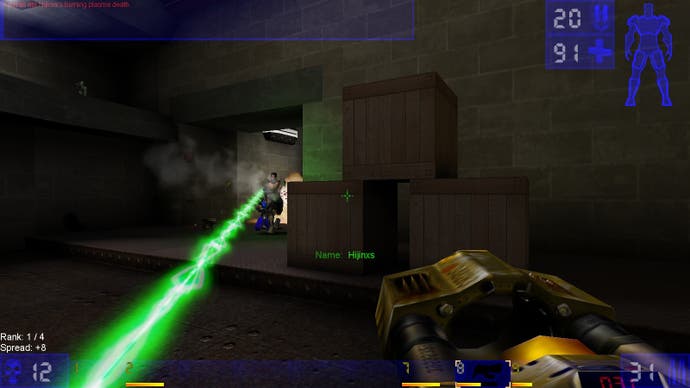
Diversity is another of UT's great strengths, and why I always preferred it to its eternal rival Quake 3 Arena. Id's multiplayer masterpiece is a pure-bred deathmatch game, but alongside those free-for-alls UT offers Domination, Capture the Flag, Last Man Standing, and last but by no means least, Assault mode. Can we all please bow our heads and take a minute to remember Assault mode? Nowadays the premise seems rote; one team is given a series of specific objectives to complete on a map, which nearly always involve either destroying something or running into a switch, while the other team must defend those key points.
That's the dull, mechanical description of Assault mode. But what you were actually doing was leaping from a helicopter onto the back of a speeding train, before battling your way to the front to commandeer the engine, or disembarking a submarine and swimming down to infiltrate and disable an underwater research base, hoping your opponents had left the entry point you'd picked unguarded. The antithesis of the anarchic deathmatch, Assault gave UT's multiplayer a specific theme and structure. It was a Hollywood action sequence with the script torn up, letting you perform the stunts and set off the pyrotechnics whenever and however you liked.
Assault mode was Unreal Tournament's party trick, but it was the ingenious map design which made it so successful, and that imagination isn't restricted to that one mode. In fact, all of my favourite maps are to be found in Capture the Flag. There's November, a sprawling, twisting asymmetric labyrinth set in an underground Nuclear Submarine base, with the red and blue halves of the map divided by the towering hull of the parked vessel. Meanwhile, The Lava Giant sets the scene on a planet being torn apart by its own volcanic activity, where two stone fortresses separated by a hollow crag protected each team's flag, making any assault on the enemy base a daunting prospect.
But my favourite map is and always will be Facing Worlds - perhaps the iconic Unreal Tournament locale. Set on a spinning, diamond-shaped asteroid with two needle-like towers stabbing into space at either end, taking a flag on Facing Worlds involved dancing through a deadly rain of sniper-fire like a weaponised Gene Kelly. As a defender, the availability of UT's ludicrously powerful Sniper Rifle and the Redeemer, the game's handheld nuclear-missile launcher, meant that cries of "M-M-M-MONSTER KILL!" rang out with alarming frequency.
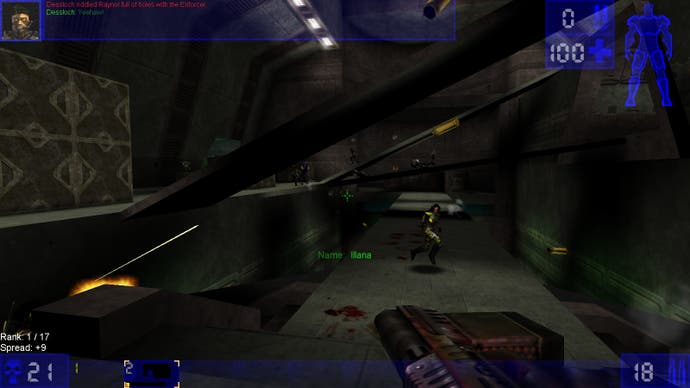
Unreal Tournament revels in its own violent nature. Headshots and what today we'd call "killstreaks" are announced with sonorous joy by the Tournament's booming-voiced commentator, and the bots ruthlessly mock their victims with cries of "You suck!" and "I'm sorry, did I blow your head apart?" But it's deliberate in its hyperbole. Its fiction of a government corporation sponsoring a bloody gladiatorial contest evokes shades of Stephen King's Running Man, or Kōshun Takami's Battle Royale, released in the same year as UT.
Calling UT satirical would be a stretch, but there is a subtlety beneath the viscera, a deadpan mocking of the ravaged, corporatist world the Tournament takes place in, and the people in control of it. UT's world is one where death has been negated by a real-life respawning mechanic, so superficially death and violence no longer matter. And yet the screams of the dying are no less bloodcurdling, the tone of its arena glossaries no less biting at the use of institutions like the Codex to please a baying crowd. Devoid of the worrying earnestness of some modern multiplayer FPS', Unreal Tournament is aware of its own nastiness, and counters it by being in turns absurd and subversive.
Returning to UT for the purposes of this article, I was worried that after three sequels and 15 years it wouldn't hold up. But such concerns were needless. As is so often the case, the game's quality is largely preserved by the excellent sound design, the crack of the sniper rifle, the roar of the rocket launcher, the industrial whirring of the Flak Cannon. I must also mention Alexander Brandon's excellent musical contribution, particularly the menu theme which introduces itself with the abruptness of a punch to the nose, and whose creeping plucked strings are synonymous with sweltering summers of the early 2000s.
My brother and I have grown up to be quite different people. He enjoys sport and dancing and hasn't touched a game in years, while I still cling to the joys of my youth like a chubby toddler to a favourite teddy bear. But I think even now if I offered to kill him in a spot of CTF on Facing Worlds, he'd happily oblige. For that bizarrely enduring bond, and so many other good times, Unreal Tournament, I thank you.
